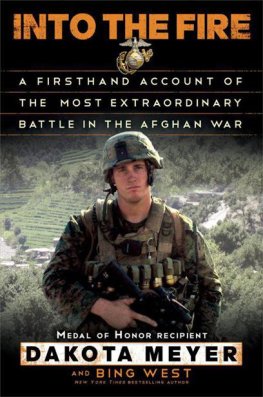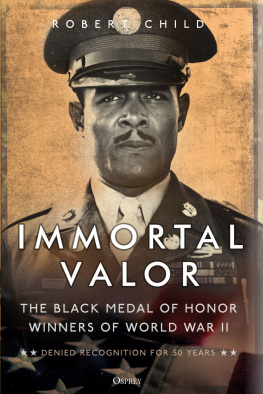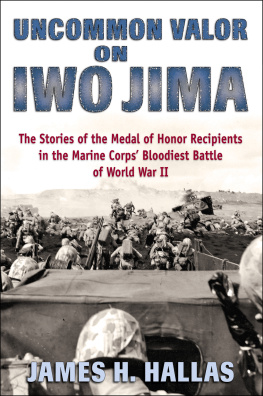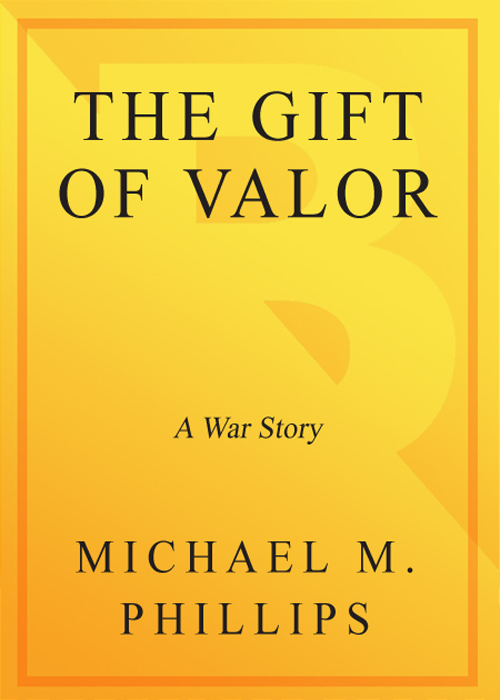
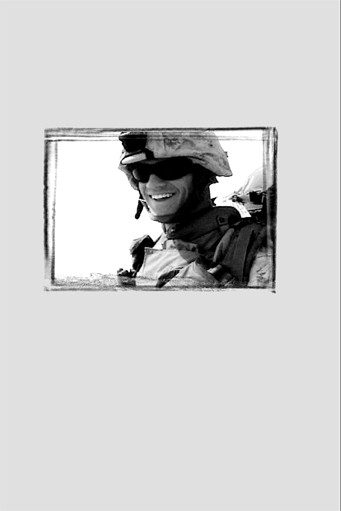
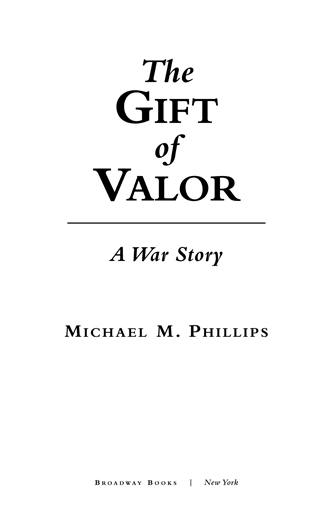
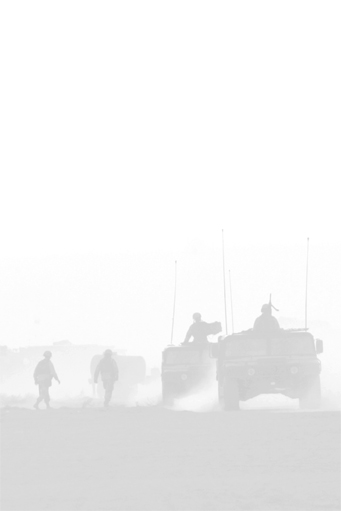
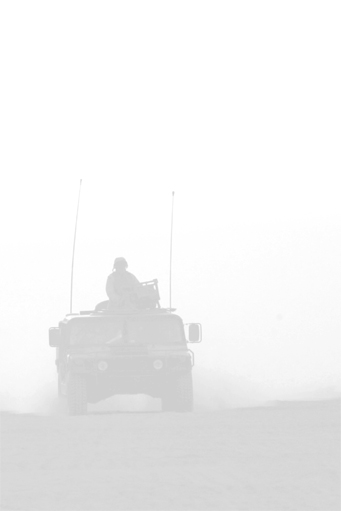
CONTENTS
Valor is a gift. Those having it never know for sure whether they have it till the test comes.
Carl Sandburg
PROLOGUE|Hand Grenades
Husaybah, Iraq
THE MARINES KNEW.
Somewhere in this desert city, in one or two or ten of those flat brown houses, someone was waking up, kneeling down for prayer, and planning to kill Americans today. Maybe he'd launch a rocket into the U.S. camp and spray hot metal fragments into the warehouses where the Marines lived packed tightly together. Perhaps he'd rig an artillery shell to explode along the street where an American patrol would pass in the evening. He might load explosives into the trunk of an old Toyota and press the gas pedal to the floor when the Marine sentries opened fire at the camp gate. Or would he just crouch behind a wall with a machine gun and wait?
From inside the fortified camp, each Marine looked out at the angry city of Husaybah and wondered when and where and how. And whether he'd measure up when the time came.
So it was in the spring of 2004, Corporal Jason Dunham sat behind the razor wire and sandbags wondering what he'd do if today was the day someone in Husaybah woke up, grabbed a hand grenade, and set out to kill him.
Raised in the village of Scio, New York, the easygoing Corporal Dunham stood six-foot-one, with a bodybuilder's chest and an infectious, lopsided smile that disarmed wary young women and crusty old sergeants alike. His temples were shaved close, in the Marine style, and the top of his head was covered by a dirty-blond burr so short that it erased the cowlick above his forehead. Inked into his right arm was the tattoo he got during boot camp four years earlier: a skull wearing a military helmet emblazoned with the eagle-globe-and-anchor Marine emblem. On his left arm was a black skull with fangs, and on his chest a spade from a deck of cards overlaid with a skull gnawing on an eight ball, a souvenir of the years Dunham spent guarding a submarine base in Georgia before he was sent to Iraq.
The twenty-two-year-old Dunham was, in the eyes of his fellow Marines in Kilo Company's Fourth Platoon, the poster child for the Corps. Yet he had been in the combat zone just a few weeks and so far hadn't experienced that moment of fear and elation, resolve and doubt that came with taking another man's life. As the leader of an infantry squad, he had nine other Marines under his command, yet he had never had to decide which of his friends to send toward the sound of gunfire and which to keep safer in the rear. It was an interval of uncertainty when young men hoped their cocky war tattoos were more than just decoration.
Inside Camp Husaybah, the men of Fourth Platoon slept side by side on narrow cots, their only privacy a thin mesh of mosquito netting or a draped poncho, their only reminders of life before war what they packed in their seabags. Dunham brought a blue Yankees cap, a dartboard, and a folding chair from which he held court. That day in March the corporal sat inside the warehouse barracks with his platoon commander, Second Lieutenant Brian Robinson, and guided the conversation to a favorite topic: how to deal with an incoming hand grenade. The Marine Corps published manuals that covered almost every eventuality in warfare, but had no formal advice for gruntsthe Marines' affectionate term for infantrymenwho found themselves on the receiving end of a live grenade. Each man had his own pet theory, and Corporal Dunham unveiled his for the lieutenant. If the Marine managed to cover the grenade with his helmet, Dunham said, the helmet's bullet-resistant Kevlar material would blunt the blast. I'll bet a Kevlar would stop it, Dunham said.
Brian Robinson had taken command of Fourth Platoon just before it shipped out for its second tour of duty in Iraq in February 2004. At Camp Husaybah, the Marines were still getting to know their new lieutenant, and it was there that they gave him the nickname Bull because of his resemblance to the gawky courtroom bailiff in the long-canceled television sitcom Night Court. When the conversation turned to hand grenades, Robinson, assistant manager of the building materials department at a Wisconsin home improvement store before he joined the Marines, thought back to photos he had seen at the Marine Corps school for freshly minted lieutenants. They showed a 7.62 mm bulletthe kind Iraqi insurgents fired from their AK-47 riflespassing easily through walls and Kevlar helmets. There's no way a Kevlar could absorb that blast, Robinson told Dunham. The Marines' bulletproof body armor fared much better, however. The lieutenant had seen pictures of a ceramic chest plate, called a SAPI plate, that absorbed seven AK rounds before it finally cracked open.
You'd be better off using a SAPI plate and protecting your nuts and your neck, Robinson told Corporal Dunham. The lieutenant showed Dunham what he meant. He held his right forearm across his upper chest horizontally, and his left arm across his abdomen, the way a football halfback takes a handoff. If the Marine lay on top of the grenade like that, Robinson said, the blast might shatter both arms, but he'd probably survive thanks to the body armor covering his vital organs.
Lance Corporal Bill Hampton, one of the senior men under Corporal Dunham's command, overheard Dunham and the lieutenant going back and forth about the virtues of their grenade theories. Hampton thought that if a grenade rolled his way the sensible thing would be to kick it or throw it away and hit the deck. He remembered an older Marine once advising him to drop face down on top of his rifle, tuck in his arms, and aim the soles of his boots toward the explosion to absorb the shrapnel. Hampton didn't bother stopping to join Dunham's debate.
One of the Marines cracked a joke about a lieutenant losing his arms, which caught the attention of Staff Sergeant John Ferguson, the top enlisted man in the platoon and Lieutenant Robinson's steady right hand. Ferguson was a stocky, serious veteran of both the intervention in Somalia and the invasion of Kuwait. From boot camp on, Marines were taught that their worst possible failing would be to let down the men beside them, and Ferguson, a thirty-year-old from Colorado, had already experienced the nerve-wracking responsibility of leading men into places they might never leave. The idea that a helmet would contain an exploding grenade struck him as naive. It'll still mess you up, he warned Dunham.
What about the helmet and the SAPI plate? the corporal countered.
It would increase your chance of surviving, but I don't think it would work, Ferguson said.
Dunham persisted. I think it would work.
For Marines at war it was a mundane conversation, the battlefield equivalent of the discussions that college students back home might have about last night's keg party or cubicle dwellers might have over where to go to lunch. Idle chatter about life and death, forgotten by the next time Corporal Dunham's squad ventured out on patrol or raided the house of a suspected insurgent fighter.
Next page

